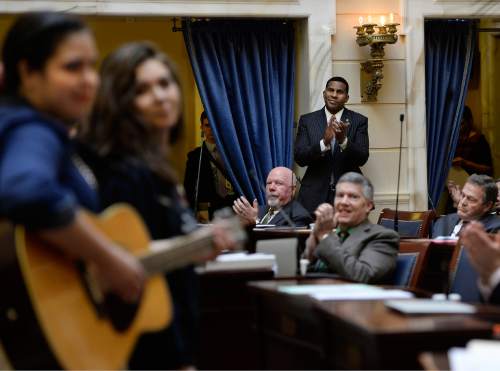This is an archived article that was published on sltrib.com in 2015, and information in the article may be outdated. It is provided only for personal research purposes and may not be reprinted.
Like hungry diners unable to make their selections, Utah's lawmakers are taking a little from menu A, a little from menu B and a little from menu C.
After years of fruitless bickering over whether the elected state school board should be partisan, nonpartisan or appointed by the governor, a trio of Republican senators have prepared a compromise bill that blends all three options.
"It allows the best elements of partisan, nonpartisan and the governor appointment process to be combined into one system," Highland Republican Sen. Alvin Jackson said Wednesday. "It gives everyone something they can support."
Under the proposal by Jackson and Cedar City Republican Sen. Evan Vickers, the 15-member state school board would be shrunk to 13 seats, with four members chosen through a nonpartisan election, four selected through a partisan election and five appointed by the governor and confirmed by the Senate.
The seats would be based on Utah's four congressional districts, Jackson said, with voters in each district represented by both a partisan and nonpartisan school board member.
"This compromise does not force candidates into an election process they're uncomfortable with," Jackson said.
Following those twin elections, the governor would serve as an "equalizer," Vickers said, ensuring that Utah's rural counties are represented on the board.
Jackson and Vickers sponsored competing school board election bills during the most recent legislative session, both of which failed in what has become an annual schism between supporters of partisan and nonpartisan school board elections.
The senators also worked with Ogden Republican Sen. Ann Millner on their compromise proposal, they said. Millner sponsored an appointed school board bill last year and hijacked a nonpartisan election bill after members of the House rejected gubernatorial appointments.
The back-and-forth between the two chambers ultimately ran out the clock on the 2015 legislative session.
"There doesn't seem to be a solution on the horizon," Vickers said. "We feel like we're compelled to do something."
Lawmakers have long been lobbied to update Utah's school board election process, which currently uses an indirect process of filtering candidates through a nominating committee and the governor, who places two names on the ballot.
But a court decision last year added fuel to the fire of reform after U.S. District Court Judge Clark Waddoups ordered the names of three rejected candidates be restored to the ballot.
Waddoups wrote in his ruling that the candidate vetting process is unconstitutional, but he stopped short of striking down the election law in order to allow lawmakers the chance to install a new system.
In describing the compromise bill, Vickers and Jackson first said their intent was to create a process that best serves students, but their response to committee questioning suggested a need to navigate the political realities of the legislature.
Using congressional districts removed the need to draw new electoral maps, Jackson said.
And the breakdown of five appointed, four partisan and four nonpartisan members was prompted by the need for an odd number of votes without giving preference to either election method, Vickers said.
But Pleasant Grove Republican Rep. Brian Greene questioned whether the parallel selection methods would create three competing factions on the school board, resulting in gridlock and inefficiency.
"Is that an effective board?" he said. "Or are we just right back at the same place we are now trying to find another solution 10 years down the road?"
And North Logan Republican Rep. Jack Draxler suggested the size of Utah's four congressional districts would make campaigning costly and time consuming for candidates, who are ultimately elected to a part-time, unpaid position on the school board.
"It will likely depend on a candidate who has resources to be able to make themselves known to such a large area," he said.
Millcreek Democrat Rep. Patrice Arent said the compromise could be confusing, since individual Utahns would be represented by as many as three school board members.
She said she prefers a nonpartisan election, and pointed to recent polling by UtahPolicy.com that showed a majority of voters in support of a nonpartisan board.
"Not only does that make the most sense to me," she said, "that's what the public has asked for."
Committee members did not take action on the bill, but indicated that it would be placed on a future agenda for further discussion.
"I think, as legislators, we owe it to our constituents to consider what is doable," Draxler said.
The compromise bill would require an amendment to Utah's constitution, which currently does not allow for appointed school board members.
If voters failed to ratify the amendment, Jackson said, the state would return to the current election process and the legal uncertainty left by Waddoups' ruling.
"We'd be back to square one," Jackson said.





